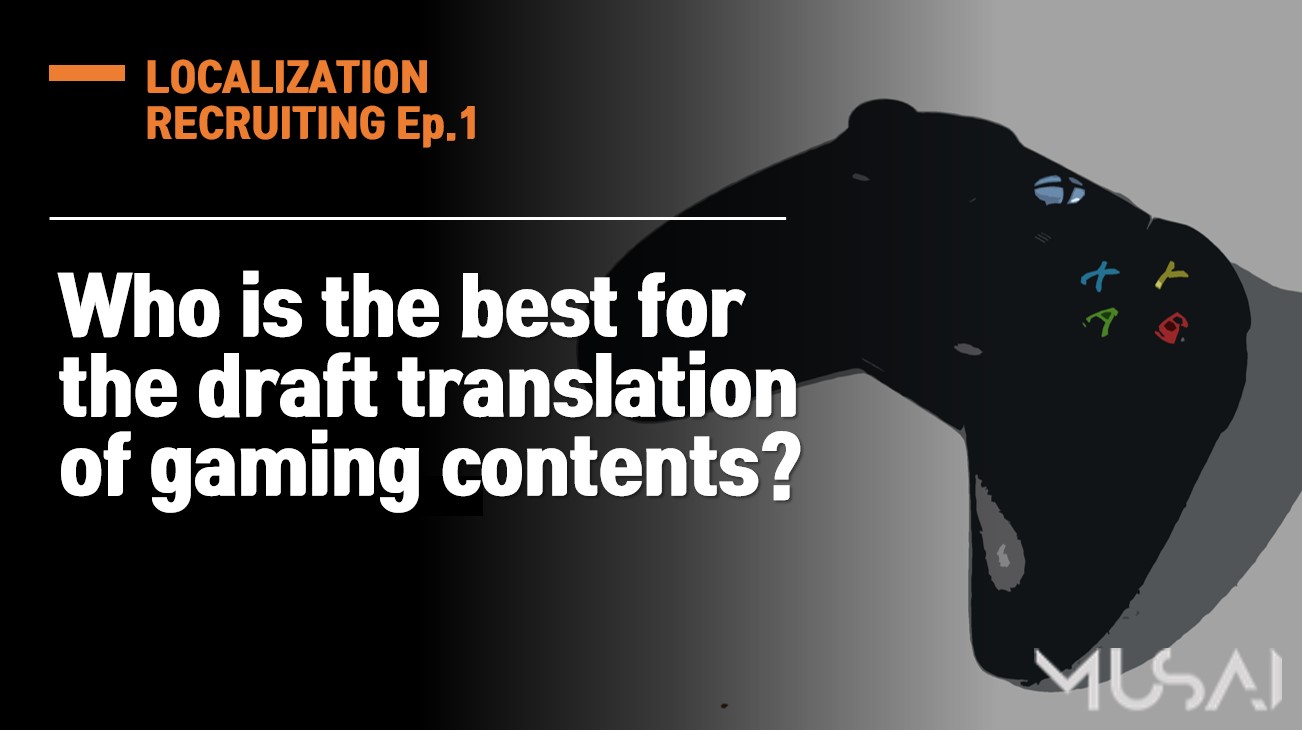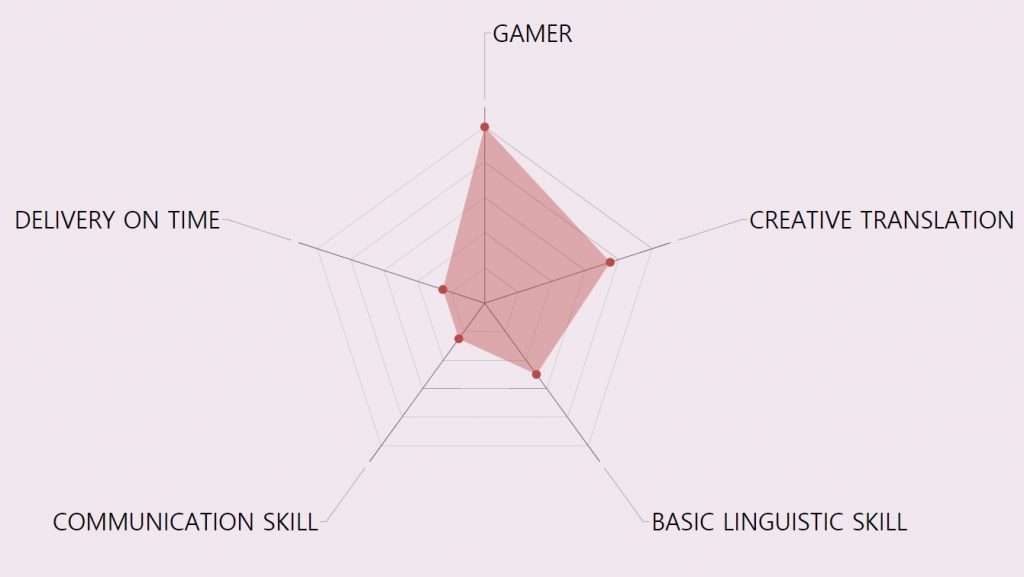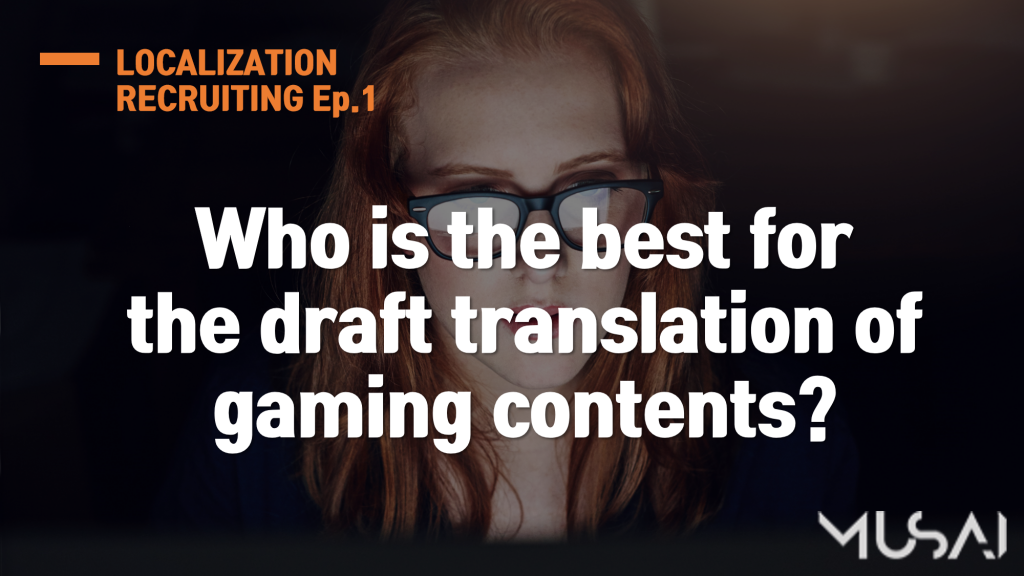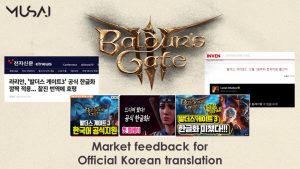[MUSAI] Localization Recruiting Ep1. “Who is the Best for the Draft Translation of Gaming Contents?”

2020-09-23
You may hear the word ‘draft translation’ at least once in your daily life even though you are not involved in the localization industry. The draft translation is the first step in localization to translate the source text into the target language. However, it became an overused word due to the advertisement such as ‘part-time translator for college students’, ‘easy part time job, draft translation’, and this phenomenon made the original meaning of it fade away. The implicit in those use is that anyone who knows the foreign language a little bit can do a translation, which is not true.
If you start off on the wrong foot in any process, the next step cannot go smoothly. The game localization process is not exceptional. Furthermore, since the draft translation is one of the key factors to finalize the quality overall, the localization agencies who know this principle put a lot of effort to recruite good translators through a highly selective process with their own criteria.
Why is the draft translation so critical in the gaming localization?
Many people in the localization industry consider the translation phase is the most important part out of TEP (Translation, Editing, and Proofreading) process. The reason is that the good quality of translation makes the later stages – the review and proofreading – easier, and the level of quality can be achieved as targeted. On the other hand, if the output from the draft translation is not decent, more time and effort are required in the next stage. The worse thing is, however, the quality will not be as good as expected no matter how hard you try to fix them.
For gaming contents particularly, the story and background of each title are very creative and unique, so the familiarization process before starting translation is considered as essential. As we talked about the familiarization process in the previous article (http://blog.musaistudio.com/musai-do-we-have-to-do-the-familiarization-process), it’s not easy to allocate a chunk of time for the game playthrough amid the tight schedule but the quality of translation is obviously improved. In a sense, we can point out that this effort is the evidence how important the draft translation is for the successful localization project.
What qualities are needed to do the draft translation for gaming contents?
1.Great understanding of games
As we mentioned earlier, the contents of games are very creative and unique by each title. Therefore, a lack of understanding of the game as a specific genre can lead to quality issues directly such as mistranslation. Besides, there are common terminology only used in games, but translation agencies and game developers usually don’t share them individually. Game translator should be a gamer who enjoys playing games and familiar with gaming terminology.
2.Transcreation rather than general translation
Games require transcreation more than literal translation compared to the other genre. That means it takes more time and needs creativity, so the translators who are used to the contents of other industry, especially very formal contents such as IT, legal, and etc., meet with the difficulties while adapting the differences.
3.Basic linguistic skills and fluency (cannot be a game translator just by playing games!)
Translation basically requires linguistic skills no matter what genre it is for. Creativity for the game translation is necessary, but it is meaningless without the basic comprehension regarding the target language in terms of grammar and cultural usage, etc.
Some translators have a broad knowledge and understanding of games but a lack of language skills. This case cannot be good either since it will have a problem to convey the right message of the contents.
4.Communication Skills
Normally, when you think of a translator, you may come up with an image of a person working in front of a monitor, being lost in thought with a frown face. Since all process of translation is ongoing in his/her mind, it may sound awkward that the communication skills are required for translators. However, they have situation to communicate with people such as localization PMs and clients more often than you think. They need to communicate about scheduling, planning, linguistic queries, and information regarding the project for the smooth progress of the project.
5.Compliance of Delivery Dates
It’s hard to be acceptable if it doesn’t meet the delivery schedule no matter how great the quality of translation comes out.

What are the types of translators and the differences?
It can be classified in various ways according to the criteria such as technical field or subject area of the text. We will explain 3 types of translators based on the employment type.
External Translators
It’s a freelance type of translators which is the most common form. Translation agencies have their own list of external translators whom they assign a project frequently to. External translators who are verified in terms of capability and reliability receive works from many agencies at once. Sometimes external translators work in the office temporarily for a particular project, which are called ‘on-site translator’.
In-house Translators
When companies have a constant need for translations, they hire in-house translators as a permanent employee. In-house translators are usually assigned to long-term projects or confidential materials. They should be responsible for a variety of tasks not only translation but also review and editing, and capable to finalize the translated material for the best quality.
Companies hire in-house translators on a contract basis sometimes, especially for big projects such as AAA titles. The bigger project needs more people and greater communication between translation team members, so they hire dedicated translators who work in the office during a certain period for those reasons.
It seems similar to the on-site translator, but the recruitment type of them is different. For example, mostly the on-site translators are the freelance basis and in-house translators are contract basis. This can be also varied depending on the project specifications and the recruiting policy of each agency.
Machine Translation Post Editor
The post editor for machine translation hasn’t been fulfilled in the actual localization process yet but the needs will be inevitable once machine translation starts to be used for gaming contents in the future. In-depth understanding of machine translation is required besides the general requirements as a translator.
How do you find a qualified translator?
Most companies recruit translators through a test with sample translations. The sample translations include various types of sentences using in games such as UI, dialogue, help, etc. and depending on the genre. All candidates are required to translate the sample translations and submit it within a deadline.
Since this test is conducted remotely for the most cases, some candidates obtain help from other persons. Therefore, if the result of sample translation is way too higher than their experiences or references, you should be doubtful and verify them in other way again.
For those who start game translations, their translation style is more importantly evaluated than grammatical issues to find out if they are suitable for gaming contents. Even if the translator passed the examination, it should be avoided to assign them to a big project right away. It is recommended to assign small projects for several times at first until thei quality and delivery requirements are checked enough.
For the experienced translators, their examples of projects they worked on are importantly considered. Experienced translators produce better result mostly from the thorough understanding of games, however, some projects listed up on CV can be exaggerated. We would like to say don’t put your trust on the references too much, and sample translation is a must-do process even for experienced translators.
Sometimes it happens that clients or friends from other industry recommend translators. The recommendation can be a good and easy way to find a qualified translator, just in the case the person who recommend them is clearly aware that localization requires more than language skills. That’s why conducting sample translation for those cases is suggested to verify their qualification.

Nowadays, there are many perceptions that the door of translation is open for anyone who is fluent in languages as the educational standard for foreign languages is getting higher. However, translation is a professional sector which requires many aspects ranging from in-depth knowledge of the source and target languages to understanding of CAT-tools, for example. Most of companies having a localization team from translation agencies to game publishers emphasize how difficult to organize a good localization team with qualified resources. That’s why they put all the continuous effort and process to find qualified translator swe talked about above for the best result.
Unfortunately, we could not give any immutable rules or specific answers in this article, since the employment and qualification of game translators can be diverse depending on ‘who is hiring, client-side or localization agencies’ and the required skills according to the projects. However, hope this article was helpful for you to understand the game translators and a part of the recruiting process in the localization industry.

** Did you enjoy the news of Musai? Please click subscribe and share the story.
BOOST YOUR PLAY! Musai Studio







